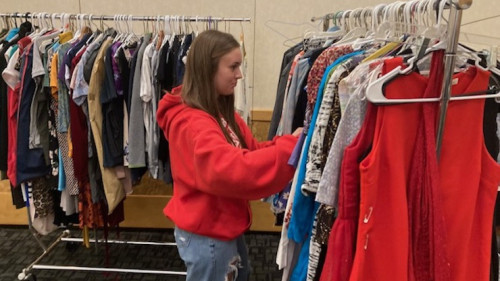
Kiley Lenahan '23 has everything from jeans to tops to coats to linens in her closet. And if you see something you like, it's yours.
Years ago, Kiley and her mom often went shopping for jeans together. The family lives on a farm which means jeans are a necessary commodity, and while out on their mother-daughter shopping trips, they'd grab jeans for Kiley's six older siblings as well. They always went to the same store, and Kiley was always free to pick out anything she wanted. That's because everything in the store was free.
When Kiley was younger, her parents owned Lenahan and Lopez - a farm to table restaurant in Rhinebeck, NY with an eclectic variety of entrees (Lopez was the chef). When the Great Recession gripped the country in 2008, fewer Americans were dining out. Many restaurants closed their doors permanently, including Lenahan and Lopez. The family of nine lost their sole source of income. Compounding the heartache, when Kiley's parents declared bankruptcy on the restaurant, their credit plummeted, which landed their house and farm (with animals) in foreclosure. Every dollar counted and jeans became a luxury. Fortunately, there was a free-use clothing closet in their hometown of Red Hook. There was no cost and no paperwork... anyone in need could walk in and help themselves and walk out.
"There's nothing wrong with what happened to us. It's not my parents' fault, but there's a stigma about asking for help. That's why the free-use clothing closet was so nice. It's anonymous. It doesn't hurt your pride as much as applying for government services."
Kiley had no idea how rare free-use closets are until she left Red Hook. Sure, every community has a thrift store, but they still charge at heavily reduced prices. Plus, free-use closets don't have to be for people with low income, they can be a place to recycle and give used items a new purpose. The idea was percolating in Kiley's mind, but inspiration didn't strike until she was in class last year with Laurie Naranch, Ph.D., associate professor of political science.
In The Politics of Clothing, Dr. Naranch lectures about the sustainability of clothing, and Kiley learned that the textile industry is the world's third largest polluter. Dr. Naranch picked up on Kiley's particular interest in the topic, and this year they've collaborated on an independent study - bring a free-use clothing closet to Siena.
Kiley has met with several department heads, and they're currently working through spacing and other logistics. But soon, Kylie intends to open her closet to the Siena community. Community members, regardless of need, will have access to the closet, and Kylie will solicit donations from students and College employees. She's already gotten a head start.
As for Kiley's family, they were able to save the house and the farm. Her dad works in real estate, and her mom runs her own business as a pet sitter. Kylie plans to go to law school and hopes to work cases for the wrongly convicted. In the meantime, she'll pay it forward. There will be plenty of jeans stocked in the Siena free-use clothing closet.
"I wanted to start a free-use clothing closet at Siena because I know how stressful it can be to access the clothes that you need when you can't afford them. It's especially stressful at our age when we use our personal style to fit in and make friends, so it can feel really isolating to not have access to those resources. After taking classes with Dr. Naranch where we learned about textile waste, I was immediately interested in starting a free-use clothing closet here because it will also play a huge role in reducing our waste on campus."
Kiley Lenahan '23

